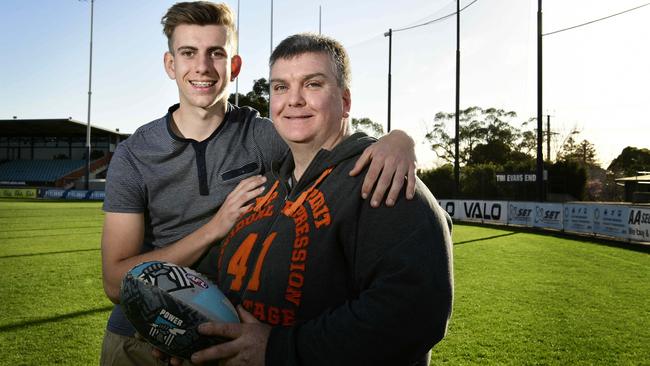Port Adelaide Football Club teaching teen boys that stopping abuse towards women can be as easy as changing the conversation
STEPPING in to stop abuse towards women can be as easy as changing the conversation.
- Our Watch research reveals disturbing views from young people about violence against women
- Lauren Novak: Girls, don’t put up with disrespect
- Breaking the cycle: Changing abusive behaviour one man at time
- Lauren Novak: Of course it’s not all men
STEPPING in to stop abuse towards women can be as easy as changing the conversation.
That’s what teenager Ryan Williams has learned from the blokes he looks up to at the Port Adelaide Football Club.
The Power to End Violence Against Women program is teaching Year 10 boys how to recognise and stand up to disrespect of women in their lives.
Seaton High School student Ryan says he does hear some “sexist jokes said about girls sometimes, how they look, what they’re wearing, what they do”.
The program, run in partnership with Centacare Catholic Family Services, showed the 15-year-old that “the best thing to do is to step in”.
“If you’re feeling too nervous to actually tell the person (making the joke) to go away, you can go over and just start up a conversation to change the topic,” he said.
“You can ask them something like if they need to go to the toilet, just to give the girl a chance to leave.”

Ryan and his father, Chris, attended a recent male role model evening at PAFC headquarters and heard from coach Ken Hinkley, captain Travis Boak, ruckman Paddy Ryder and rookie Emmanuel Irra.
“The main thing the footballers said was that they would do anything to stop their mum, or sister or daughter from being hurt,” Ryan said.
“Considering that the AFL clubs have such a big influence on us, coming from them it will get across better.”
More than 3000 Year 10 boys have taken part in the program since it was first trialled in 2016.
Power Community Limited youth programs co-ordinator Jake Battifuoco said the role model night was “an opportunity to spread important messages to more than just one generation”.
“We speak to the boys about becoming agents for change and driving real change within their communities, whether that’s in the school, in a sporting club, at home.”
For support, Call the national sexual assault, domestic family violence counselling service on 1800 RESPECT

